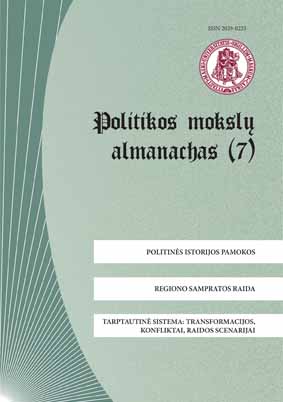Šiaurės regiono valstybių – Norvegijos, Kanados, Jungtinių Amerikos Valstijų ir Rusijos federacijos – politika Arkties atžvilgiu
The Arctic Policy of the North Region Countries – Norway, Canada, the USA and the Russian Federation
Author(s): Giedrius KviklysSubject(s): Politics / Political Sciences
Published by: Vytauto Didžiojo Universitetas
Keywords: arctic; strategy; environment; economy; national security; cooperation; arktis; strategija; aplinkosauga; ekonomika; nacionalinis saugumas; bendradarbiavimas
Summary/Abstract: Straipsnyje yra aptariamos Norvegijos, Kanados, Jungtinių Amerikos Valstijų ir Rusijos priimtos Arkties strategijos, kurių pagrindu yra įgyvendinama šių valstybių politika šiaurės poliariniame rate. Dėlto yra mėginama: a) išskirti pagrindinius šalių tikslus, b) išdėstyti tikslų įgyvendinimo priemones bei c) identifikuoti problemas, kurias pažymi kiekviena valstybė, tai pristatant per keturis elementus – daugiašalį bendradarbiavimą, aplinkosaugą, ekonomiką ir nacionalinį saugumą. Tokiu būdu sudaromos galimybės prognozuoti, kokių veiksmų ateityje gali imtis valstybės arba kaip jos elgtųsi tam tikrose situacijose. Nors Lietuvoje Arkčiai skiriama mažai dėmesio, tačiau tarptautiniuose santykiuose ji tampa vienu svarbiausių regionų, ypač dabar, kai buvo išspręstas Rusijos-Norvegijos teritorinis disputas Barenco jūroje. The article is discussing the approved Arctic strategies of Norway, Canada, the USA and the Russian Federation under which the policy regarding the North Circle is conducted. In this case, firstly, the Arctic is defined by what territory it covers, what significance to relations between the countries of the region it had in different time periods and what importance it has now. Also, the main objectives of the countries, means of realization of the objectives and the problems faced by the countries in the region are also identified here. All of this is presented in four main elements - multilateral cooperation, environmental protection, economy and national security which are identified in the strategies of Norway, Canada, the USA and Russia. Such pattern makes it possible to predict what actions the countries could take or how they could behave in certain situations in the future, and that is rather important because nowadays the Arctic becomes one of the most important regions in the world in regard to international relations, especially now when an agreement on the maritime delimitation between Norway and Russian Federation in the Barents Sea has been reached.
Journal: Politikos mokslų almanachas
- Issue Year: 2010
- Issue No: 07
- Page Range: 161-181
- Page Count: 21
- Language: Lithuanian

